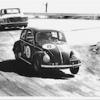
Motor sport drivers have greater fuel ecomony - true or false?
#1

Posted 14 January 2016 - 20:26
Advertisement
#2

Posted 14 January 2016 - 20:41
Probably true as an experienced [racing] driver intuitively knows how to conserve momentum and only brake as much (or rather as little) as is necessary. Call it smooth driving if you like.
As an aside, in the days of the Mobilgas Economy Run they found that the higher powered versions of a car were more economical as the engine could be run more efficiently. Say Cortina-Lotus and Cortina 1200 at the same average speed on the same route.
#3

Posted 14 January 2016 - 20:42
#4

Posted 14 January 2016 - 20:58
Let's see how much fuel you can save, driving up the 'Big Hill' to-day, Daniel. ![]()
#5

Posted 14 January 2016 - 22:43
Smoothness and using the chassis of a car will use less fuel.
I can use less fuel driving a car open road than using cruise control which tends to be a bit mindless. Though I use the cruise as it is far easier on my wonky joints!
Though even using cruise I will use less fuel than many as again driving the vehicle to keep momentum up obviously uses less fuel.
Though I have rode with decent motorsport competitors that seem to drive very inefficiently on the road.
#6

Posted 15 January 2016 - 14:47
As an aside, in the days of the Mobilgas Economy Run they found that the higher powered versions of a car were more economical as the engine could be run more efficiently. Say Cortina-Lotus and Cortina 1200 at the same average speed on the same route.
The Cortina-Lotus vs Cortina 1200 is a bit unfair because the extra expense to create the twin cam engine significantly improved efficiency. Comparison of cars fitted with 1098/948/803cc BMC A-series engines, however, showed that a little bit bigger was a little bit better -- and a lot nicer to drive.
Nowadays with variable valve timing and clever ECUs, an economy run would require a lot of driver training to get the most out of a car. For an old fashioned engine, the trick is to learn the rev range for peak torque (which corresponds with lowest fuel consumption per unit of output energy) and operate as close as possible. A driver who keeps the engine "on the boil" with few abrupt changes of throttle position will thus beat a stop-go driver.
#7

Posted 15 January 2016 - 15:11
As an example, I took over my wife's Fiesta Zetec S 1.6 TDCi and immediately started getting 70 mpg (summer) on similar journeys where she had thought her best of 63 mpg was exceptional. Only difference was carrying much more speed through corners, especially anticipating other traffic on roundabouts, and lifting off earlier, allowing speed to bleed off rather than braking. So it's mostly from competition experience, not any basic better driving.
#8

Posted 15 January 2016 - 15:13
In the Mobil Economy Run days we had Motor/Autocar Road Tests which reported fuel consumption at various steady speeds: most of those had a "cliff edge" characteristic which one could keep away from. That, together with enterprising driving to conserve momentum, gave some exceptionally frugal Mobil Economy Run results, even on a rally schedule that wasn't slow and three-up because the organisers had an observer in each car to ensure the "no coasting" rule was obeyed.
Both road test and Economy run depended on one being able to disconnect the fuel pipe. The RT team could install a flow-meter and the Economy run people used to suck the tank dry through its normal offtake before and after the event (measuring what was sucked out after and subtracting that from the known quantity added at fuelling stops). Even at the time some cars could not be treated that way so we could never have a fuel-injection car as competitor.
#9

Posted 15 January 2016 - 15:29
I dunno, racing drivers usually go pretty fast on the road and that's rarely good for fuel mileage. And they're usually pretty aggressive.
If you read up on the technique of 'hypermilers' it's pretty much the opposite of how a racing driver behaves ![]()
#10

Posted 15 January 2016 - 15:56
I dunno, racing drivers usually go pretty fast on the road and that's rarely good for fuel mileage. And they're usually pretty aggressive.
If you read up on the technique of 'hypermilers' it's pretty much the opposite of how a racing driver behaves
I've read several reports that Ayrton Senna was a very plodding driver in a road car, some writers seemed to be surprised at how slowly he drove.
#11

Posted 15 January 2016 - 17:41
They said the same of me - only in a racing car....
#12

Posted 15 January 2016 - 18:57
Judy Lyons probably gets 40 mpg from her F5000 Eagle ![]() . but thanks to her for bringing it along anyway - a slow Eagle is better than no Eagle at all ,,,
. but thanks to her for bringing it along anyway - a slow Eagle is better than no Eagle at all ,,,
#13

Posted 16 January 2016 - 15:55
Judy Lyons probably gets 40 mpg from her F5000 Eagle
. but thanks to her for bringing it along anyway - a slow Eagle is better than no Eagle at all ,,,
The fuel efficiency of a stationary car with running engine is zero mpg. The fuel efficiency of a big V8 racing car, measured in mpg, at less than optimal racing speed will be very low single figures (declined from a low starting point). I presume that the team who prepare Judy Lyons' cars tweak the ignition and fuel systems to accommodate her driving style.
#14

Posted 16 January 2016 - 17:49
I wasn't being entirely serious ![]()
#15

Posted 16 January 2016 - 18:07
I have read that GV was a wild man on the road, but perhaps was perfectly in control by his standards. My ex used to try and pass everything on the road and I
have a friend who was a wannabe race driver on the road and offered a terrifying ride for a passenger.
My T/A camaro used to get 4 mpg at racing speed.
Robert
#16

Posted 16 January 2016 - 18:18
I wasn't being entirely serious
I was too serious. But we have to respect the technicians who can put a chugger pilot into a race alongside chargers.
Who is cleaning the spark plugs tonight? Or are they throw away consumables?

















